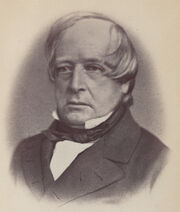| ||||||||||||||||||||||||||||||||||||
John Slidell (1793 – July 9, 1871) was an American politician, lawyer and businessman. A native of New York City, Slidell moved to Louisiana as a young man and became a staunch defender of Southern rights as a U.S. Representative and Senator.
When Louisiana seceded, Slidell resigned from the Senate and headed home, swearing allegiance to the Confederate States. After the American Civil War began, Slidell accepted a diplomatic appointment in September 1861 to represent the Confederacy in France. He and James Murray Mason ran the Union blockade via Charleston, South Carolina, then embarked at Havana on the British mail steamer RMS Trent, but were intercepted by the United States Navy and taken into captivity at Fort Warren, Boston. After Britain threatened war, the USA admitted that the capture had been conducted contrary to maritime law, and that private citizens could not be classified as ‘enemy despatches’. Slidell and Mason were released, and war was averted.
Slidell reached Paris in February 1862, and paid his first visit to the French minister of foreign affairs. Despite his efforts, no nation ever granted recognition to the CSA.
Slidell never returned to North America, and spent his remaining years in France and England.
John Slidell in The Guns of the South[]
John Slidell traveled, with much difficulty, as an envoy to Paris during the Second American Revolution, but was unable to obtain French recognition for the Confederate States until the CSA had secured a decisive victory. French Foreign Minister Édouard Thouvenel told Slidell that recognition might have come in 1862, but for the issue of slavery.[1] Robert E. Lee was convinced that the support of slavery was what made the Confederacy an international pariah, and determined that the institution could not be allowed to endure much longer.
References[]
- ↑ The Guns of the South, pgs. 252-253.
| |||||||||||||||||||

